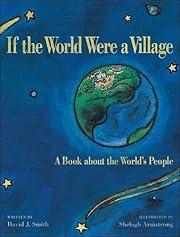

Carregue numa fotografia para ir para os Livros Google.
|
A carregar... If the World Were a Village: A Book about the World’s Peoplepor David J. Smith
 Ainda não há conversas na Discussão sobre este livro.   ) )Presently, there are more than 7.5 billion people in the world.They all believe in different religions, eat different foods, wear different cloths,And many are literate while others are not.This book helps put into perspective how diverse the population of the world really is. If the world only had 100 people in it how many would have enough to eat and how many would have jobs?This book provides the statistics to all the classifications you could think of. If the world were a village is a interactive multicultural book. The theme of this book is to explore the world around you. This book is great for teaching students about the differences of the world. The book acts as if the world only consisted of 100 people, then divides the world based on different topics. One of the very first pages puts the population of the world in perspective. It said if the world only had 100 people, 60 would be from Asia. Only 5 would be from the United States and Canada. This will be very educational for our students who don't look at the world as anything more than the United States. This book is great for learning about new cultures. The diction is very informative and the images are simple but also educational. This book, “If the World Were a Village,” takes students on a journey to explore how diverse our world really is. Students enter a “global village,” made up of people from different continents, of different religions, races and ethnic backgrounds. The reader takes a look inside the global village, allowing students the opportunity to see how people all over the world live which allows for student compare and contrast cultures. “If the World Were a Village” teaches students that not everyone is alike, to appreciate our world’s diversity and to be grateful for the rights we are given. I enjoyed reading this book for three main reasons. One of the main reasons I liked this book is because it address tough issues with the readers. This book talks about different aspects of life for humans all over the world—education, religion, schooling and money. Since every culture is different, it educates readers about how others live. One of my favorite lines in the book is found in the education section when the author says “of the 88 people old enough to read, 71 can read at least a little, but 17 cannot read at all. More males are taught to read than females.” This line is important because students can sometimes take their education for granted, but realizing that boys and girls all over the world do not receive an education can act as an important life lesson about being grateful for the little things in life. Additionally, I liked the illustrations in the book. One of the reasons I liked the illustrations is because they depicted people of all different ages and races in their cultures traditional attire. This is important for readers to see in books because it shows that no two people are alike. Lastly, I thought this book was well organized into different sections that made sense for the reader. Each page had a different subtopic and the information provide was only about that topic. The illustrations on each page corresponded to the topic being discussed. One example of this is when the author discusses food—she gives statistics about hunger throughout the world and shows a food market where certain villagers can purchase their food. Additionally, each page provides accurate facts for the reader which is important because it puts into perspective the message the author is trying to portray and makes it easily understandable for young readers. Overall, I really enjoyed reading this book and would recommend it to students. In my opinion this is a great book. The entire plot and concept of the story is very interesting. The author manages to take the population of the world and look at it as if there were only 100 people. By looking at the world this way the information becomes much more attainable for children because they may not fully understand the idea of billions and millions. It is helpful for students to understand how vast the world is and their place in it. The statement about if there were 100 people in the world 61 would be from Asia and only 5 people from North America really stood out to me. I feel that it is a common feeling among people that the United States is one of the biggest nations and that the world revolves around it; however, that is not true as seen by the numbers. Another reason I like this book is because it can be used across subjects. It could be used in language arts, geography, and even in math when learning proportions. The big idea of the story is for people to open their eyes to the world. It gets children thinking about the world as a whole and different cultures. sem críticas | adicionar uma crítica
Pertence a SériePrémiosNotable Lists
Comparing the world population to a village of 100 persons, the author reveals such facts as the languages of the village, how much each earns, if the person is literate, has a television and has enough to eat. Não foram encontradas descrições de bibliotecas. |
Current DiscussionsNenhum(a)Capas populares
 Google Books — A carregar... Google Books — A carregar...GénerosSistema Decimal de Melvil (DDC)304.6Social sciences Social Sciences; Sociology and anthropology Factors affecting social behavior PopulationClassificação da Biblioteca do Congresso dos EUA (LCC)AvaliaçãoMédia: (4.2) (4.2)
É você?Torne-se num Autor LibraryThing. |
||||||||||||||||||||||||||||||||||||||||||||||||||||||||||||||||||||||||||||||||||||||||||||||||||||||||||||||||||||||||